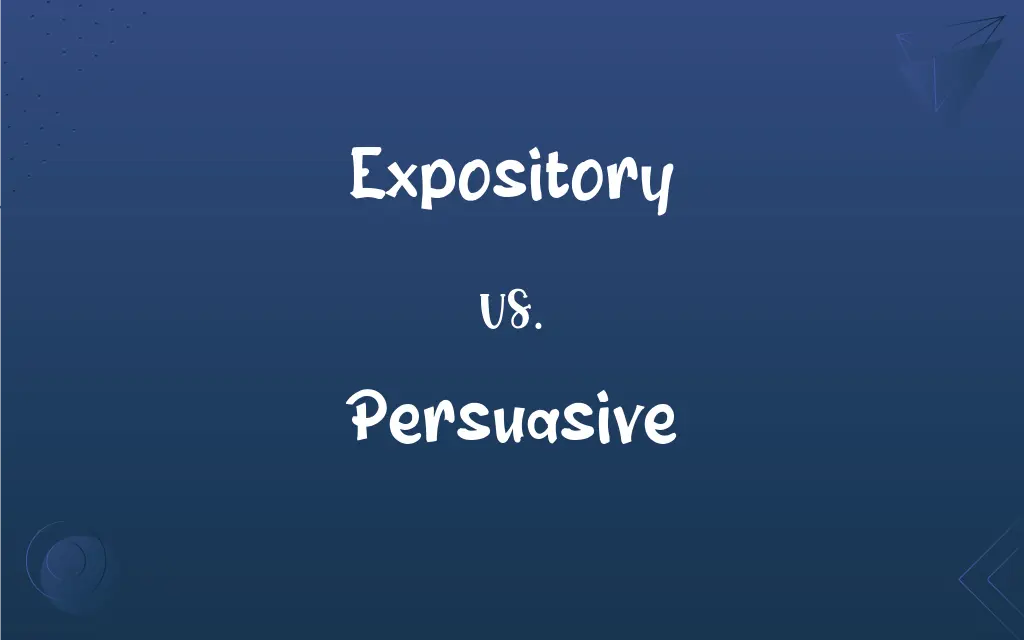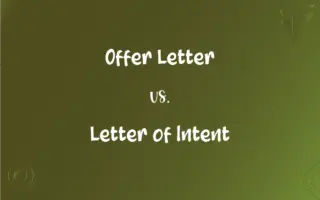Expository vs. Persuasive: What's the Difference?
Edited by Aimie Carlson || By Harlon Moss || Published on January 10, 2024
Expository writing aims to inform or explain, while persuasive writing intends to convince or persuade the audience.

Key Differences
Expository writing is factual and informative, focusing on explaining or clarifying a subject. In contrast, persuasive writing aims to convince the reader to accept a particular viewpoint or take a specific action.
An expository piece presents a balanced and unbiased view of a topic, often using data, statistics, or factual evidence. Persuasive writing, however, is characterized by emotional appeals, opinionated statements, and arguments to influence the reader's beliefs or actions.
The structure of expository writing typically includes a clear introduction, body paragraphs detailing the subject, and a concise conclusion. Persuasive writing, meanwhile, often adopts a more aggressive approach, using persuasive language and rhetorical devices to make a compelling case.
Expository writing is commonly used in educational settings, such as in textbooks or academic articles. Persuasive writing is frequently found in advertising, political speeches, and opinion pieces, where the goal is to sway the audience's opinion or behavior.
Expository writing is about conveying information and providing understanding, while persuasive writing is about arguing for a specific point of view and trying to change the reader's mind.
ADVERTISEMENT
Comparison Chart
Purpose
To inform and explain
To persuade and convince
Tone
Objective and neutral
Emotional and opinionated
Content
Factual, unbiased information
Arguments, opinions, and appeals
Structure
Logical, clear organization
Aggressive, persuasive tactics
Examples
Textbooks, how-to articles
Advertisements, opinion editorials
ADVERTISEMENT
Expository and Persuasive Definitions
Expository
Expository works often use data and evidence for explanation.
The report included expository graphs on market trends.
Persuasive
Persuasive texts use emotional appeals and opinions.
The speech was persuasive in advocating for change.
Expository
Expository texts are educational and enlightening.
His expository essay on solar energy was highly informative.
Persuasive
Persuasive writing seeks to convince readers to agree.
His persuasive essay argued for renewable energy adoption.
Expository
Expository writing is characterized by clarity and neutrality.
The manual's expository style made the instructions easy to follow.
Persuasive
Persuasive writing often involves argumentative techniques.
The advertisement used persuasive language to sell the product.
Expository
Expository writing aims at delivering comprehensive understanding.
The teacher's expository lecture clarified complex concepts.
Persuasive
Persuasive writing can sway public opinion or decisions.
The lawyer's persuasive argument swayed the jury's decision.
Expository
A setting forth of meaning or intent.
Persuasive
Persuasive works aim to influence attitudes or behaviors.
The campaign's persuasive message inspired many to vote.
Expository
A statement or rhetorical discourse intended to give information about or an explanation of difficult material.
Persuasive
Tending or having the power to persuade
A persuasive argument.
Expository
The art or technique of composing such discourses.
Persuasive
Able to persuade; convincing.
Expository
The first part of a composition in sonata form that introduces the themes.
Persuasive
That which persuades; incitement.
Expository
The opening section of a fugue.
Persuasive
Tending to persuade; having the power of persuading; as, persuasive eloquence.
Expository
The part of a play that provides the background information needed to understand the characters and the action.
Persuasive
That which persuades; an inducement; an incitement; an exhortation.
Expository
An act or example of exposing.
Persuasive
Tending or intended or having the power to induce action or belief;
Persuasive eloquence
A most persuasive speaker
Expository
A public exhibition or show, as of artistic or industrial developments.
Persuasive
Capable of convincing;
A persuasive argument
The evidence is persuasive but not conclusive
Expository
Serving to explain, explicate, or elucidate; expositive; of or relating to exposition.
Practicing expository writing will teach you to explain complex concepts clearly.
Expository
Pertaining to, or containing, exposition; serving to explain; explanatory; illustrative; exegetical.
A glossary or expository index to the poetical writers.
Expository
Serving to expound or set fourth;
Clean expository writing
Expository
Expository writing presents facts to explain or inform.
The article provided an expository overview of climate change.
FAQs
Where is expository writing commonly found?
In educational materials, like textbooks and articles.
Can expository writing include opinions?
No, it focuses on facts and neutral information.
What distinguishes persuasive writing?
Its goal is to convince or persuade the audience.
What structure does expository writing follow?
A logical and clear organization.
Is expository writing subjective or objective?
It's objective and unbiased.
Are persuasive texts factual?
They can include facts but often emphasize opinions.
Can persuasive writing change someone's mind?
Yes, it aims to influence opinions and decisions.
Is expository writing suitable for debates?
Not typically, as it's more informative than argumentative.
What is the tone of persuasive writing?
It's often emotional and opinionated.
What is expository writing?
It's writing that explains or informs about a topic.
What are examples of expository content?
How-to guides, scientific reports, and explanatory articles.
What is a key element in persuasive writing?
The use of rhetorical questions and appeals.
How does persuasive writing engage the reader?
Through emotional appeals and argumentative tactics.
What role does evidence play in persuasive writing?
It supports arguments but is often less central than in expository writing.
Can persuasive writing be factual?
Yes, but it's usually combined with emotional and opinionated elements.
Can persuasive writing be unbiased?
No, it inherently contains bias as it seeks to persuade.
How do expository and persuasive writings differ in advertising?
Expository provides product information, while persuasive aims to convince consumers to buy.
Is narrative writing a type of expository writing?
No, narrative writing tells a story, while expository explains facts.
Do expository texts use first-person narration?
Rarely, as they aim for an objective tone.
How do expository and persuasive writing differ in education?
Expository is used for teaching and explaining, while persuasive is used in debate and rhetoric classes.
About Author
Written by
Harlon MossHarlon is a seasoned quality moderator and accomplished content writer for Difference Wiki. An alumnus of the prestigious University of California, he earned his degree in Computer Science. Leveraging his academic background, Harlon brings a meticulous and informed perspective to his work, ensuring content accuracy and excellence.
Edited by
Aimie CarlsonAimie Carlson, holding a master's degree in English literature, is a fervent English language enthusiast. She lends her writing talents to Difference Wiki, a prominent website that specializes in comparisons, offering readers insightful analyses that both captivate and inform.






































































